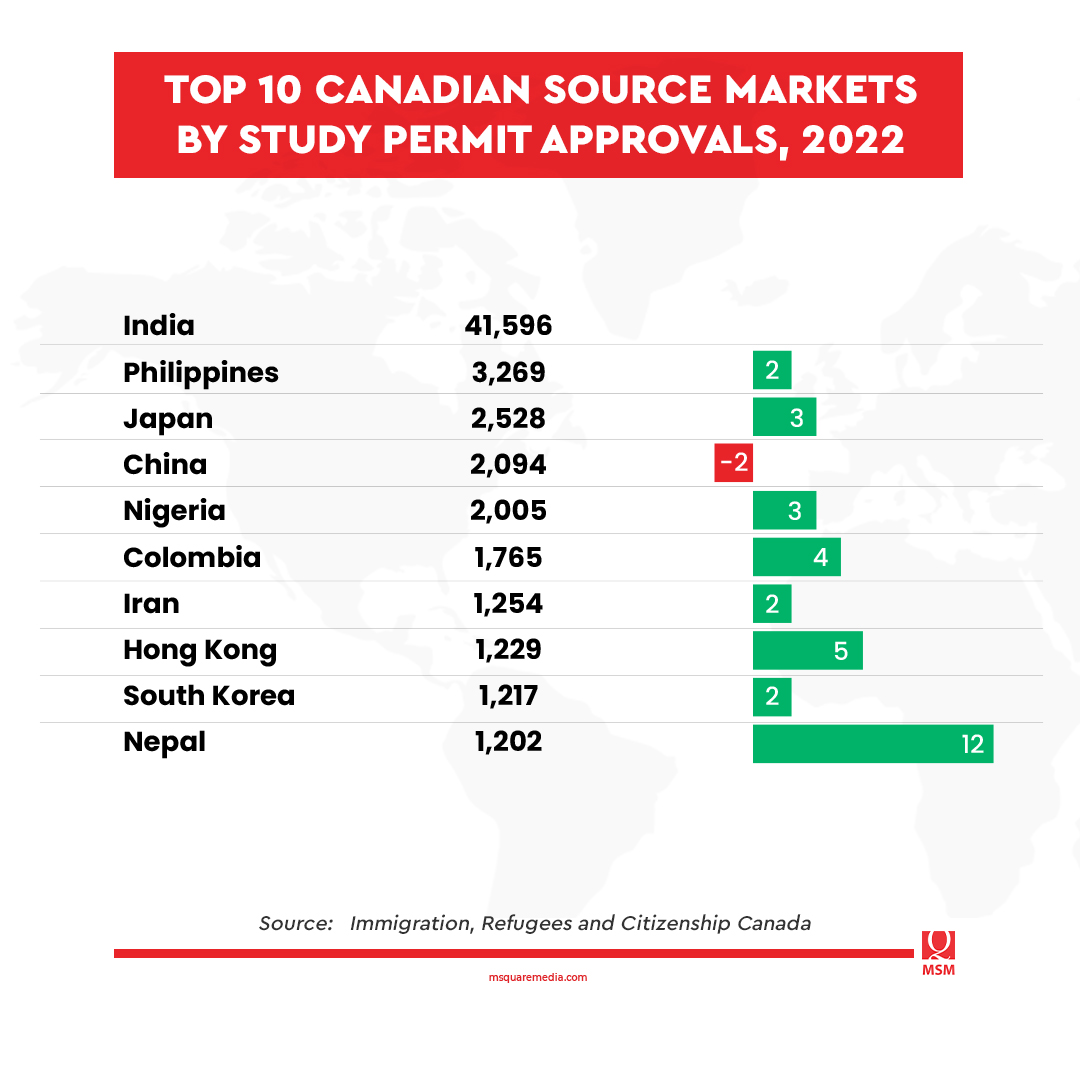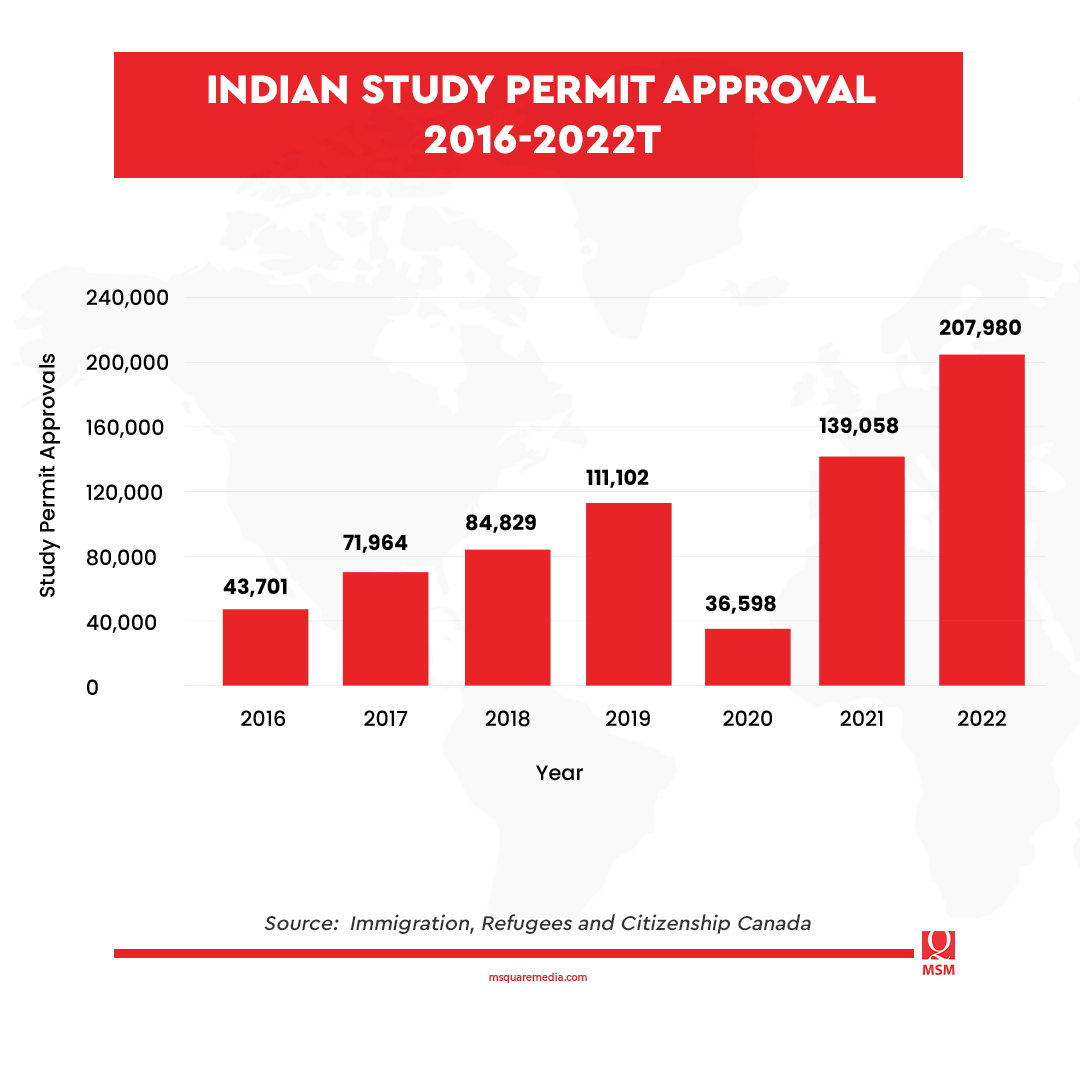Key Takeaways:
- According to 2022 IRCC data, Nepal has jumped 12 spots and successfully entered the top 10 Canadian source markets in terms of study permit approvals with 1,202 approvals.
- The Indian market is soaring with over 41,000 approved students to study at a Canadian institution and 207,980 permit approvals projections.
- From being just an emerging market for the Canadian International Education sector, the Philippines has now become the largest source of international students outside India and China.
Canada is one of the top-of-mind destination hubs for international students across the globe. Although the country was highly vulnerable during the pandemic, Canada’s successful response and stability pulled international students back into the country.
“As a result of the COVID-19 pandemic, there were 528,200 international students in 2020, representing a 17% decrease from 2019 and the first annual decline in the international student population in Canada in 20 years. The number of international students increased to 621,600 in 2021,” Canada statistics revealed.
The first quarter of 2022 showed potential growth for the international education sector. From January to March, the recent data from Immigration, Refugees and Citizenship Canada (IRCC) revealed high study permit approvals, especially in India and emerging markets in Asia.
Asia as a Growing Source Market
The Canadian government is sticking to the core of its 2019-2024 International Education (IE) Strategy. It can be recalled that one of its key points highlighted the diversification of its source market countries. It also encouraged the country’s local students to study and work abroad in key global markets, especially in Asia.
The early data released by IRCC suggested a rose-colored future for the rest of 2022 for Canadian International Education.

Nepal is an emerging source market to watch out for. In the 2022 IRCC data, Nepal has successfully entered the top 10 Canadian source markets by study permit approvals with 1,202 approvals. The country jumped 12 spots from the previous ranking, already succeeding at 55% of its 2021 study permit approvals total.
According to IRCC, the study permit approval rate for Nepali students was 41% and continuously rose to 88%. Moreover, International student numbers in Canada from selected growth markets revealed that Nepal has surprisingly had 93.3% growth from 2020 to 2021.
The massive surge from the Nepalis can be attributed to Canada’s quality of education, affordable fees, work opportunities, and the sense of safety and security for international students due to low crime rates and low cases of racial discrimination.
We also have to take note that there is plausible growth when it comes to Filipino students. From being an emerging market for the Canadian International Education sector, the Philippines has now become the largest source of international students outside India and China. From its 19th standing in 2016, the Philippines impressively jumped to the number two spot six years later.
The Indian Market
In the data released by IRCC in 2019, more than 50% of Canada’s international students come from two countries, India and China. Reports said that China remains the second-largest sender of students to Canada, but it sent 9.6% fewer students in 2021, amounting to 105,265 study visas.

While the number of Chinese students is yet to recover, the Indian market is soaring with over 41,000 approved Indian students to study at a Canadian institution. This record was accumulated only for the first three months of this year. Looking at this, India has already surpassed its 36,598 total students during the height of the pandemic. This also looks encouraging as the government projects 207,980 student permit approvals by the end of the year.
A Solution to Labor Shortage
The number forecasts an early celebration for Canada. While it is too early to call it a win, the increase in the number of Student Permit approvals can be a good sign of recovery. And to be more specific, this data could mitigate Canada’s crisis in the skills gap.
As previously discussed, former Minister of Employment and Social Development Canada, now Premier of Alberta, Jason Kenney, once stated that the skills gap is one of the biggest economic challenges facing the country. In a survey conducted by BDC, with more than 1,200 entrepreneurs and 3,000 of the working-age population asked, 55% of Canadian entrepreneurs are struggling to hire the workers they need and more than a quarter are struggling with employee retention. As a consequence, they tend to work longer hours and delay or refuse orders.
Conclusion
International education leads to immense and growing participation in Canada’s prosperity. The rocketing of future international students in Canada will further contribute to the country’s innovations, culture, and economy. Hence, the Canadian government, businesses, international education institutions, and solutions providers and partners must work on diversifying the demographics, offering scholarships and other financing options, creating a wider choice of pathway programs, and strengthening the welfare of international students. (SUNEETHA QURESHI)

SUNEETHA QURESHI
MSM President
Suneetha has worked for 15 years in the international education sector and 25 years overall for various industries. As president of MSM, she fortifies its business development outreach globally, particularly in the face of MSM’s foray into edtech-based recruitment via MSM Unify. She preserves the premium, value-adding services provided to each MSM partner institute, including dedicated teams on the ground, agent management, lead generation and inquiry management, application prescreening, and student and parent support through pioneering pre-departure briefing sessions.
She has an impeccable track record of successfully launching the representative offices in Asia and Africa of many North American and European higher education institutions. Her key strengths include hiring, training, and developing teams as evidenced by the successful results of the dedicated in-country college and university client teams.
Suneetha also has taken the lead in developing several initiatives at MSM, including building robust standard operating procedures, the Rise ‘n Shine team engagement platform, and the organization’s data analytics and audit segments.
Sources:
- Crossman, et al. 2022. International students as a source of labour supply: A summary of recent trends. Statistics Canada. Retrieved from https://www150.statcan.gc.ca/n1/pub/36-28-0001/2022003/article/00001-eng.htm
- El-Assal, K. 2022. Canada set to welcome over 500,000 newcomers this summer. CIC News. Retrieved from https://www.cicnews.com/2022/06/canada-set-to-welcome-over-500000-newcomers-this-summer-0625936.html#gs.3p8yp1
- Forde, H. 2022. Demand for international education rises in 2022. Gulf News. Retrieved from https://gulfnews.com/uae/education/demand-for-international-education-rises-in-2022-1.1650971711166
- El-Assal, K. 2021. Canada welcomed 450,000 new international students in 2021, an all-time record. CIC News. Retrieved from https://www.cicnews.com/2022/03/canada-welcomed-450000-new-international-students-in-2021-an-all-time-record-0323762.html#gs.3p93x3
- El-Assal, K. 2020. 642,000 international students: Canada now ranks 3rd globally in foreign student attraction. CIC News. Retrieved from https://www.cicnews.com/2020/02/642000-international-students-canada-now-ranks-3rd-globally-in-foreign-student-attraction-0213763.html#gs.3p9q28
- 2020. Building on Success: International Education Strategy (2019-2024). Government of Canada. Retrieved from https://www.international.gc.ca/education/strategy-2019-2024-strategie.aspx?lang=eng
- Webster, B. Why is Canada a safe place to live. New Canadian Life. Retrieved from https://newcanadianlife.com/why-is-canada-a-safe-place-to-live/
- How to Adapt to the Labour Shortage Situation. BDC.
Retrieved from https://www.bdc.ca/en/about/analysis-research/labour-shortage
- Data and figures from Immigration, Refugees and Citizenship Canada. Retrieved from https://www.canada.ca/en/immigration-refugees-citizenship.html

